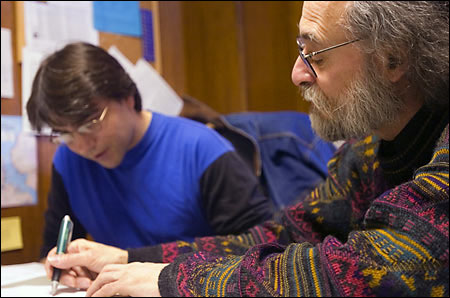Teaching people to read and write is a Community Gift

This is the third in a series of Gazette articles highlighting some of the many initiatives and charities that Harvard affiliates can support through the Community Gifts Through Harvard Campaign. Gifts will continue to be accepted throughout the holiday season.No one knows exactly how many Massachusetts residents need help to improve their reading, writing, or English conversational skills. However, often cited as a partial measure of limited skills is a 2000 study by the Massachusetts Institute for a New Commonwealth. According to the report, “New Skills for a New Economy,” 1.1 million of the state’s 3.2 million workers don’t have the skills necessary to perform in the state’s rapidly changing economy and need adult basic education skills and services. Harvard employees may earmark funds for Literacy Volunteers of Massachusetts by sending their donations through the Community Gifts Through Harvard Campaign, 124 Mt. Auburn St., Room 420 South, Cambridge, MA 02138, by calling (617) 495-1598, or by visiting http://www.community.harvard.edu/communitygifts. Literacy Volunteers of Massachusetts (LVM) is providing some of these services by helping adults learn to read, write, and speak English. “People need to read, write, and think critically in order to function in everyday roles that everyone has as a worker, as a community member, and as a parent,” said Roberta Soolman, LVM’s executive director. Literacy Volunteers was founded in 1972, has 13 programs around the commonwealth, and helps both native and non-native speakers of English. LVM trains volunteers to provide free, confidential and individualized tutoring to adults in basic reading and writing and English to Speakers of Other Languages (ESOL). Volunteers attend 20 hours of training and are then paired up with a student to help the student reach individual goals.Most LVM students are older than 25 and most basic literacy students won’t attend traditional classroom-based instructional programs, according to Soolman, because of fear, embarrassment, or past failure in the classroom. “Many of these adults have spent their lives hiding this issue from the people who know them,” she said. In Boston, LVM provides basic literacy tutoring to native English speakers, and both basic literacy and ESOL through Project Lighthouse, LVM’s partnership with several homeless shelters.The students set their own goals and, most often, “these goals have to deal with things that you and I do on a daily basis and take for granted,” said Soolman. Things like: “‘I’d like to write a shopping list; I’d like to take a phone message; I’d like to be able to read my mail.’ The ESOL students have the same goals but also want to be able to talk on the telephone, get directions, speak better to get a job, or study for citizenship.” As the name suggests, LVM’s tutors are volunteers. They are usually older than 45, love to read, and are people who “can’t imagine trying to navigate life on a daily basis without being able to read or write,” said Soolman.Last year, LVM helped approximately 900 Massachusetts adults learn to read, write, and/or speak English through more than 37,000 hours of free tutoring. The Boston programs have waiting lists of people who would like assistance, but they must wait because LVM doesn’t have enough tutors or other resources to serve them all.Donated funds are used to recruit volunteers and students, train volunteers, support tutor/student pairs, buy materials for LVM’s lending libraries, and sponsor recognition events honoring both tutors and students.




